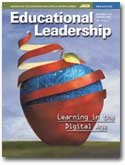December 1, 2005
•
5 min (est.)•
Vol. 63•
No. 4All About Accountability / The Reauthorization Rumble
No Child Left Behind (NCLB), the current incarnation of a far-reaching federal law first enacted more than 40 years ago, is scheduled for reauthorization in 2007. Not surprisingly, both the critics and defenders of NCLB are already gearing up to influence the results. Will the next version of this law, a statute initially called the Elementary and Secondary Education Act of 1965, be meaningfully altered or merely massaged? This will surely be the most crucial education issue facing the United States in just over a year.
I know little about education politics in Washington, D.C., living as I do on Kauai, one of the Hawaiian Islands. I'm much happier surrounded by a fish-laden ocean than immersed in a politician-laden capital. Besides, it's easier for me to spot the sharks.
However, on a recent trip to Washington, D.C., I ran into a few friends who stay attuned to education-related Congressional deliberations. Despite my usual political-avoidance proclivities, I simply couldn't resist the opportunity to ask these savvy folks about the likely future of NCLB. Almost without exception, they indicated that although 2006 might bring some minor “flexibility” adjustments of the law's accountability provisions, there will be no tampering in the immediate future with the fundamentals of NCLB's school evaluation strategy. In other words, the law will still require schools to show that their students have made adequate yearly progress on achievement tests aligned with a state's academic content standards. Any basic changes in the way NCLB accountability works, everyone agreed, will wait until 2007, when a heated reauthorization fight is almost certain.
What worries me about the upcoming reauthorization rumble is that those deliberations may take place without the sort of evidence necessary for sensible decision making. Let's be realistic. A good many policymakers have already made up their minds regarding the legislation, and scads of organizations are currently on record as adoring or deploring NCLB. Many of these groups have adopted NCLB positions that are, in essence, intractable. For example, will any sort of evidence ever convince the National Education Association that NCLB, despite some shortcomings, is really a winner? Will any sort of evidence convince the Bush administration to scrap the fundamental accountability provisions of NCLB?
But let's consider the most fundamental question of all:Has NCLB helped students learn more and, in particular, has it benefited historically underserved students and reduced achievement gaps? If we had persuasive evidence to help us answer this cornerstone question, it could be particularly illuminating as NCLB reauthorization hearings approach.
After all, if NCLB—as currently crafted—appears to be working, then there should be relatively few modifications in the law. If, on the contrary, evidence shows that NCLB isn't working, then a substantial overhaul of the law seems warranted. But without such evidence, we'd better get ready for relentless bickering. NCLB proponents will trot out a string of anecdotal success stories while NCLB critics ladle up loads of instructional horror stories.
We need credible nonpartisan agencies to undertake even-handed appraisals of NCLB's impact on student achievement. Such investigations, of course, are easier to call for than to implement. Because each of our 50 states has been given considerable latitude in implementing significant provisions of NCLB's accountability strategy, it is literally impossible to carry out any sort of one-size-fits-all national study of the law's impact. One state might have super-challenging content standards, a set of tough accountability tests, and stringent cut-score levels for students to classify as proficient. However, if another state has far lower standards, NCLB could appear to be “working” in one state yet “stumbling” in another.
Above all, any evidence bearing on whether NCLB has improved student achievement must be conducted by groups with no axe to grind. This rules out slanted studies churned out by right-leaning or left-leaning think tanks.
While in Washington, D.C., I happily came across one promising study-in-gestation that exemplifies what I hope we'll see lots more of. The nonpartisan Center on Education Policy (CEP) is in the early stages of planning a study that could deal objectively with the question of whether NCLB has contributed to student achievement. The Center's leaders recognize that their projected study must be patently evenhanded, yield accurate results, and be readily understandable to policymakers as well as the general citizenry. CEP officials intend to rely on hard evidence instead of anecdotes and make sure that such data will be reviewed by demonstrably impartial evidence-review teams or, failing that, by evidence-review teams representing both pro- and anti-NCLB dispositions.
I hope the Center on Education Policy will move forward with its intended study, and that other nonpartisan groups will investigate the same question. What we need in 2007 is not a round of reauthorization ranting. We need credible evidence about whether NCLB is really improving student learning.
